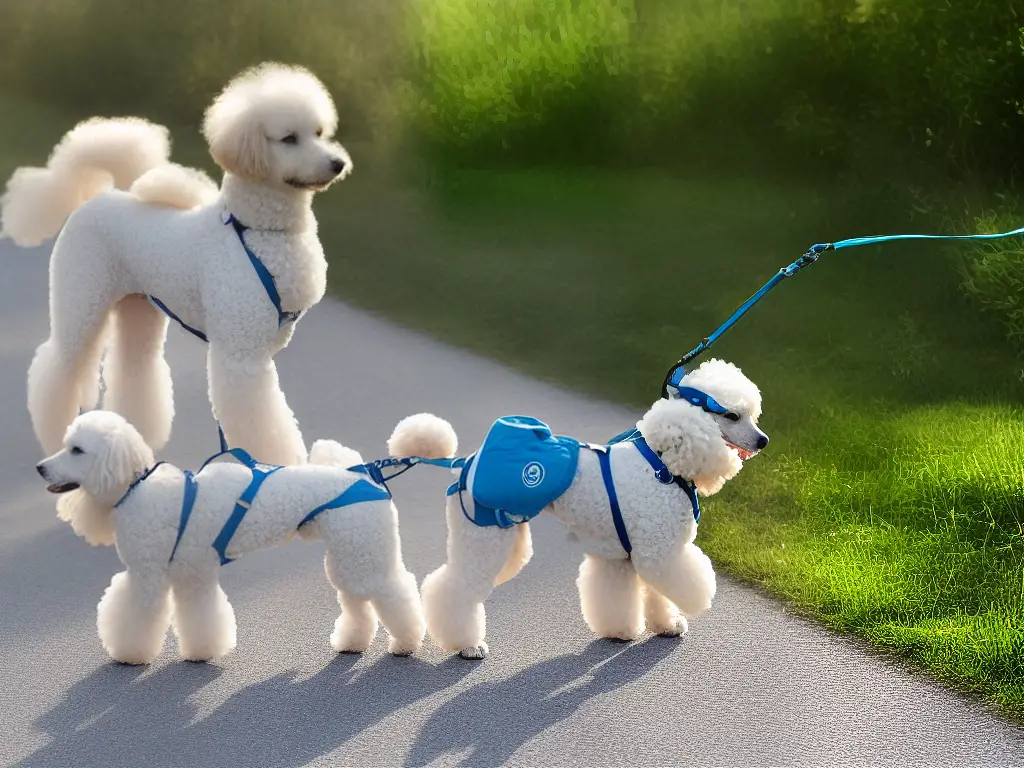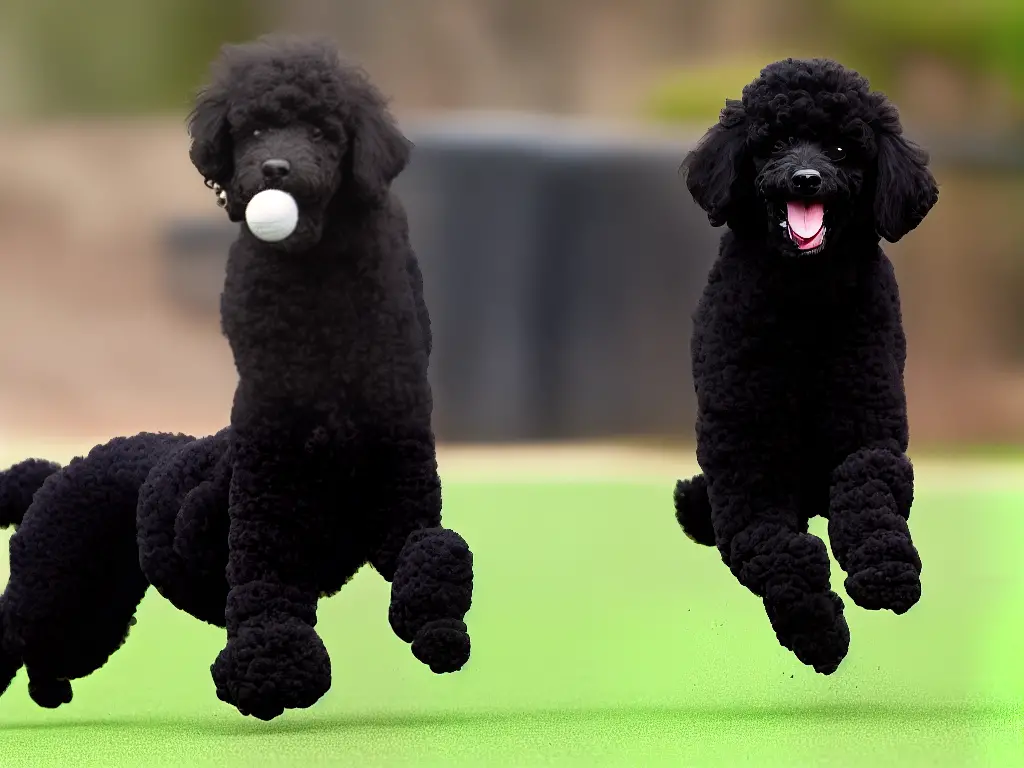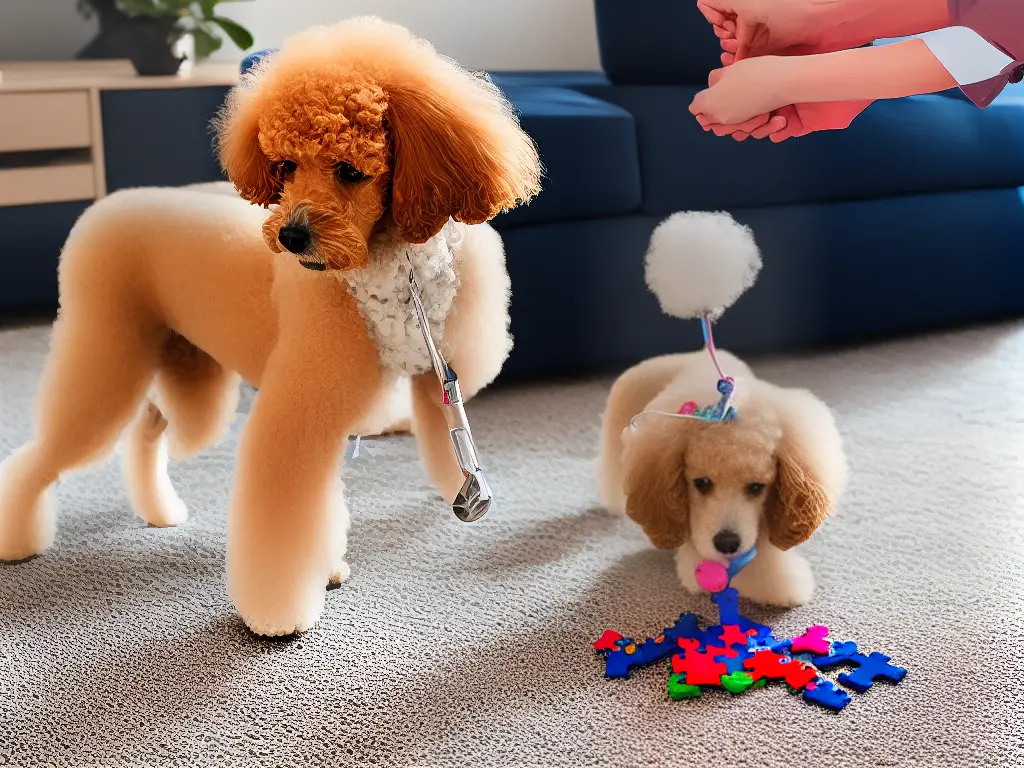Poodle Exercise Research Plan
As highly intelligent and energetic pets, poodles require both physical exercise and mental stimulation to maintain their overall well-being. By understanding their unique behaviors and needs, we can provide our poodles with a fulfilling and active lifestyle. This discussion touches upon various aspects, including the differences in size categories, suitable activities, exercise safety, training methods, health and nutrition, and mental stimulation for poodles.
Poodle Behavior and Exercise Needs
Poodle behavior, whether they are standard, miniature, or toy-sized, can vary significantly depending on the individual dog’s temperament and personality. However, poodles are generally known for their intelligence, loyalty, and friendly nature. They are highly energetic dogs and therefore, require sufficient mental and physical stimulation to keep them happy and healthy. Without enough exercise, poodles tend to become restless, anxious, and may exhibit destructive behaviors such as chewing and digging.
Energy levels among poodles generally correlate with their size, with larger poodles generally having higher energy levels compared to smaller ones. Standard poodles are the most athletic among the three types, requiring more substantial amounts of exercise to keep them mentally and physically fit. A standard poodle’s exercise regimen should include at least one hour of physical activity every day, such as walking, hiking, or swimming. In contrast, miniature and toy poodles have relatively lower energy levels. They may still enjoy a moderate daily walk or energetic play session, but the duration and intensity can be shorter than that of a standard poodle.
In addition to physical exercise, poodles also have a strong need for mental stimulation due to their intelligence. This can be provided through puzzle toys, obedience training, and interactive games that challenge their brains. Participating in dog sports such as agility, obedience, or tracking can also provide both mental and physical exercise for poodles, while also strengthening the bond between the dog and their owner.
When exercising poodles, it is essential to be mindful of their physical limitations, especially for miniature and toy varieties, as they can be prone to certain health issues. For instance, all poodles should be protected from intense heat, while activities that involve substantial jumping or impact on their joints should be limited to prevent injury or wear and tear. Toy and miniature poodles in particular may be prone to luxating patella and hip dysplasia, so it’s crucial to build an exercise routine that takes these conditions into account, focusing on low-impact activities and avoiding excessive strain on their joints.
Understanding the specific needs and preferences of your poodle is crucial when determining an exercise routine to meet their requirements. Some poodles may prefer a relaxed pace with longer walks, while others may enjoy high-intensity activities like fetching or playing chase. Monitoring factors such as energy levels, weight, and overall health can help adjust the exercise routine of a poodle, ensuring a happy, healthy, and well-exercised companion.

Poodle Exercise Activities
The size and age of your poodle can influence the types of exercises suitable for them. Walking is a versatile activity that keeps poodles engaged mentally and physically while helping maintain a healthy weight. Poodles generally need at least 30 minutes of walking daily, ideally split across two separate walks to regulate their energy levels. Be cautious of temperature extremes, as poodles can easily become overheated or chilled, and adjust the walking duration accordingly to ensure a smooth and enjoyable experience for both you and your furry friend.
Running is an excellent cardiovascular workout for both humans and dogs. It not only strengthens the bond between the poodle and their owner but also enables the dog to enhance its endurance and muscle strength. Regular running sessions can make a significant difference in the overall health and temperament of your poodle. It is essential to ease your dog into the running routine gradually, increasing the distance and speed as the poodle becomes more comfortable and physically capable.
Swimming is another fantastic form of exercise for poodles, as these dogs are natural water lovers, and it provides low-impact exercise for dogs with joint or muscle issues. Whether it’s taking a dip in a pool, pond, or at the beach, swimming can help poodles build muscle and stay in shape without putting excessive stress on their joints. Always ensure your poodle’s safety when swimming, by checking water quality and current conditions, and investing in a lifejacket for the dog if necessary.
Fetch is a classic game that most dogs love, and poodles are no exception. Throwing a ball or toy for your dog to retrieve provides an opportunity for physical and mental stimulation, as the poodle exercises its hunting and retrieving instincts. The game of fetch can be made more challenging and engaging for the pooch by using different shapes, textures, and even hiding the toys for them to find. Fetch can be a great bonding activity between an owner and pet, bringing endless fun and satisfaction to both parties.
Agility training and dog sports like flyball are excellent options for poodles, as they are highly intelligent and energetic breeds. These activities combine physical and mental exercise, challenging the dog to navigate obstacles, follow commands, and work as a team with their human handler. Training in agility sports not only strengthens the bond between a dog and owner but also provides a fun way to keep your poodle mentally sharp and physically fit. Participating in local clubs and competitions can introduce your poodle to a community of like-minded dog owners and enrich their social experiences.

Poodle Exercise Safety
Ensuring poodle exercise safety is essential for maintaining your dog’s overall health and well-being, and it’s crucial to consider several factors. Among such factors are weather conditions, which can have a significant impact on your dog’s safety. Poodles are adaptable to different environments, but they can still suffer from heatstroke or hypothermia if you don’t take appropriate measures. During hot or cold temperatures, adjust the duration and intensity of their agility exercises and other activities by providing shorter or less demanding options. Always ensure that your poodle has access to clean water to keep them hydrated, making both physical and mental exercise safe and enjoyable for your furry companion.
Another factor to consider in poodle exercise safety is the risk of exercise-induced injuries. Poodles are active dogs and, consequently, prone to injuries such as sprains and strains, particularly in their joints, muscles, and ligaments. To minimize these risks, engage your poodle in consistent and moderate physical activity rather than subjecting them to sudden and intense exercises. Also, provide a warm-up and cooldown session before and after their workout to facilitate safe muscle engagement.
As your poodle participates in regular physical activity, it’s crucial to monitor them for any signs of discomfort or overexertion. Poodles may not always show pain or distress, making it critical for owners to observe their dog’s behavior and body language for any abnormal changes. Some symptoms to watch for include limping, fatigue, heavy panting, or reluctance to continue their activity. If you notice any of these signs, stop the exercise immediately and consult your veterinarian if necessary. Introducing a proper exercise regime early in your poodle’s life can help prevent potential risks and health issues.
Equipping your poodle with essential gear can make exercise safer and more enjoyable for both pet and owner. For example, using a harness instead of a collar can help reduce pressure on your poodle’s neck during walks and allow better control. Non-slip shoes can protect your dog’s paws from hot surfaces, such as asphalt or sand, and prevent injuries from sharp objects. Additionally, reflective gear is essential when walking or running with your poodle in low-light conditions, ensuring other people and vehicles can see your dog.
To ensure your poodle’s safety and long-term health, it is crucial to recognize their specific needs and capabilities based on their age, size, and overall health. Puppies and senior poodles require different levels of exercise than adult poodles. By observing your poodle’s reactions to different activities and adjusting accordingly, you can provide a safe and enjoyable exercise experience for them.

Poodle Training Techniques
In addition to providing appropriate exercise, consistency and patience are key in obedience training for poodles. Poodles are intelligent dogs that can learn quickly but can also be stubborn. Beginning with simple commands such as sit, stay, and come, use positive reinforcement like treats and praise for desired behaviors. Repeat the commands frequently and ensure everyone in your household uses the same commands to avoid confusion. As your poodle masters basic commands, gradually progress to more advanced obedience training, making exercise and training a rewarding bonding experience.
Leash training is essential for providing safe and effective exercise for your poodle. This will not only teach your dog to walk politely on a leash, but will also prevent him from pulling or lunging at other animals or people. To begin leash training, always use a fixed-length leash and a secure collar or harness. Start by walking your poodle in a controlled environment, like your yard or a quiet street, and gradually progress to busier locations. When your poodle pulls, gently redirect him back toward you, using a cue like “heel” or “close”. Reward your poodle with praise and treats when he walks nicely by your side.
Off-leash training is crucial for poodles, as it allows them to enjoy more freedom while still being under your control. Poodles are known for their high energy levels and need ample time to run and play without the constraints of a leash. However, since they are also prone to chasing after small animals or wandering off, off-leash training should only be done in a secure environment, such as a fenced-in yard or a designated off-leash dog park. Train your poodle to come when called, regardless of distractions, by consistently practicing recall with rewards and praise. Start by calling your poodle from a short distance, gradually increasing the distance as they become more reliable.
Socialization skills are an important aspect of poodle training and should be incorporated into their exercise routine. Well-socialized poodles are more likely to be confident and well-behaved when they encounter new experiences, environments, animals, and people. Begin socializing your poodle early, preferably during their critical developmental period, which is between 3 and 14 weeks. Expose your poodle to various environments, such as parks, stores, and public transport, while ensuring positive experiences. Also, allow your poodle to meet different types of people and animals, keeping interactions positive and controlled.
Poodles are known for their intelligence, agility, and grace, making them an ideal breed for various dog sports and activities. To keep a poodle physically and mentally engaged, proper exercise and nutrition are crucial components of their overall health. Since poodles have a lean body structure and energetic nature, they require a balanced diet that supports their unique needs, including high-quality proteins, carbohydrates, vitamins, and minerals.

Poodle Health and Nutrition
Building agility is another great way to exercise your poodle’s mind and body. Poodles are excellent agility dogs, as they are both quick learners and physically agile. Introduce your poodle to obstacles like jumps, tunnels, and weave poles in a controlled setting, such as an agility class or at home using DIY equipment. Start by teaching one obstacle at a time and gradually adding more as your poodle improves their skills. Always use positive reinforcement and maintain a fun, rewarding environment for your poodle as they learn new skills. Practicing agility can provide both mental and physical exercise, helping your poodle stay happy and healthy with their balanced diet.
Choosing the right dog food can greatly impact a poodle’s health, energy levels, and longevity. There are many factors to consider when selecting a diet, including the dog’s age, size, weight, and activity level. Most dog food brands offer breed-specific formulas that cater to the nutritional requirements of the poodle, but consulting with your veterinarian can help determine the most suitable diet for your dog. Look for reputable brands that use high-quality ingredients and avoid those with artificial additives, by-products, and preservatives.
Understanding portion sizes and feeding schedules is also crucial to maintaining a poodle’s ideal weight and preventing obesity-related health issues. Serving sizes may vary depending on the dog’s size, age, and activity level. Generally, smaller poodles require less food than larger poodles, and more active dogs require more food than less active counterparts. A veterinarian can provide specific guidance on portion sizes and feeding schedules tailored to your poodle’s needs.
In addition to providing an appropriate and balanced diet, stimulating a poodle’s body and mind through regular exercise is imperative. Poodles are highly versatile and can excel at various activities such as agility, obedience, swimming, and tracking. Engaging with your poodle in these activities can help create a strong bond between you and your dog while keeping them physically fit and mentally challenged. Be sure to monitor your poodle’s exercise routine and make any necessary dietary adjustments to support their energy expenditure.
Keeping your poodle healthy and happy is essential, which includes being aware of any signs that may indicate an issue with their diet or exercise routine. It’s important to monitor changes in their weight, coat condition, and energy levels. Regular veterinary check-ups can help identify potential issues and ensure that your poodle maintains a healthy, active lifestyle. By providing proper nutrition and exercise, you can support your poodle’s well-being and happiness, ensuring a long-lasting, healthy life together.

Poodle Exercise and Mental Stimulation
Poodles are an incredibly intelligent and energetic breed, which means they require both physical exercise and mental stimulation to stay happy and healthy. While physical exercise, such as walks and playtime, is essential for maintaining their overall health, mental stimulation is equally important for keeping their minds sharp and engaged. Ensuring regular mental exercise can help reduce common behavioral problems that may result from boredom, such as excessive barking, digging, and chewing, contributing to a better overall quality of life for both you and your poodle.
One way to provide mental stimulation for your poodle is through the use of puzzle toys. These can range from simple treat-dispensing toys to more complex puzzles that require problem-solving skills for your dog to access the reward. Poodles love a challenge, and using their intelligence to solve puzzles is an excellent way to keep their minds engaged. Puzzle toys can also be a great way to make mealtimes more exciting, as your poodle will need to work for their food.
Another mentally stimulating activity to try with your poodle is scent work. Scent work, also known as nose work, is an activity that allows dogs to use their keen sense of smell to search for specific scents, often mimicking the work of detection dogs. This can be done with food or scent training, but many dog owners choose to hide specific odors, like essential oils, for their dog to locate. By using their natural scenting ability, poodles are not only engaging their minds but also building confidence and forging stronger bonds with their handler.
In addition to puzzle toys and scent work, trick training is another fantastic way to provide mental stimulation for your poodle. Trick training involves teaching your dog new tricks or commands, such as shaking hands, rolling over, or even more advanced tasks like fetching items or performing agility moves. Not only does trick training improve communication between you and your dog, but it also provides them with a sense of achievement and pride when they master a new skill.
Finally, incorporating interactive toys and games into your poodle’s daily routine can provide additional mental stimulation. This could include activities like fetch, hide and seek, or even dog sports like agility, flyball, or obedience competitions. These activities not only challenge your poodle’s mind but also provide an opportunity for them to socialize with other dogs, people, and environments. By keeping your poodle’s mind sharp and engaged through a variety of activities, you’ll be helping to ensure they lead a happier and more fulfilling life.

Ultimately, a well-exercised and mentally stimulated poodle is a happy and healthy one. By incorporating a variety of activities, teaching them essential skills, maintaining their health and nutrition, and offering opportunities for mental challenges, we can enhance the overall quality of life for our lovable poodles. This will not only strengthen the bond between you and your pet but also promote their long-term physical and mental well-being. May this guide serve as a foundation to encourage a fulfilling and active lifestyle for your poodle companion.
